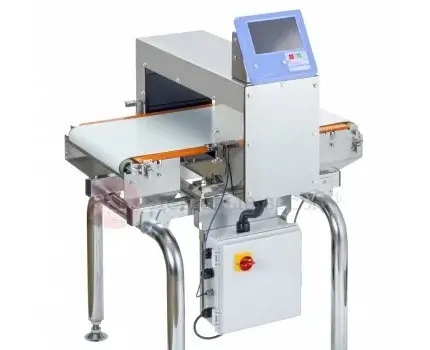A metal part can get into the product for various reasons: breakdown on the conveyor line, human factor, disruption of technological processes. If a defective product is not eliminated in time, it will reach the end consumer. At best, this will entail sanctions from supervisory organizations; at worst, the company will lose its license and go bankrupt.
A conveyor metal detector is specifically designed to detect metal particles in products, materials or raw materials at various stages of production. The device plays an important role in maintaining high quality products in many enterprises, from the food industry to pharmaceuticals.
The article contains five reasons why a conveyor metal detector is necessary in modern production.
Quality guarantee
The primary task of a metal detector is to prevent metal particles from getting into the product. If a product containing metal reaches the market, it can cause serious harm to human health. For example, the presence of metal fragments in food can cause injury to the mouth or digestive tract, which in turn can lead to serious legal consequences for manufacturers.
Compliance with Standards and Regulations
Many Industry standards and regulations such as ISO, HACCP, GMP and others require quality control processes - including the detection of metal contamination in products. The use of conveyor metal detectors helps companies meet these requirements.
The installation of such a device on a production line is not regulated by law, but business owners do not neglect the “assistant” - the law on consumer protection has not been repealed.
Increasing production efficiency
Modern metal detectors are capable of processing large volumes of products in a short time. Their integration into conveyor lines allows you to automate the process of identifying defects, which reduces the risk of human error and increases overall productivity.
Models can be customized for different types of products and production conditions, which allows them to be used on a variety of production lines. In addition, many devices are equipped with self-diagnosis and self-calibration functions, which makes them easier to operate and maintain.
Protection of equipment
Metal particles can lead to equipment failure, rapid wear and, in some cases, - to emergency situations. Detection and removal of such particles early in production avoids costly repairs and downtime. The device will detect metal before it causes damage to the equipment.
Economic benefits
Despite the initial costs of purchasing and installing metal detectors, they pay for themselves in the long run. Prevention of manufacturing defects, financial losses from product recalls, fines and lawsuits from consumers lead to significant savings in the company's resources and funds.
So, a conveyor metal detector is an integral element of the modern production process. Investments in these devices help maintain product quality, increase the competitiveness of the enterprise and increase consumer confidence in it. You can purchase an industrial metal detector from specialized companies, for example, here.




